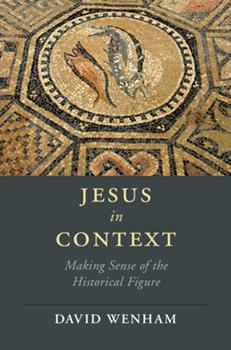Q. One of the more interesting historical nuggets in your book is about how Nazareth seems to have been a resettlement town for Judean Jews. Interestingly, the name of the town ‘Branch town’ or something like it, might suggest a connection with Bethlehem. Had you thought about that? I quite agree that the old chestnut that Jews in Galilee were more Hellenized and less pious seems to be clearly refuted by all the mikvehs that are being found in Galilee.
A. Just when I was starting serious work on my book, I received a copy of Rainer Riesner’s brilliant new book Messias Jesus. It is a mine of information about the history, archaeology and context of Jesus, including about Nazareth, the Branch town, Bethlehem, Jerusalem etc. etc.. I hope it gets translated into English before too long, because it is illuminating (with maps, diagrams and pictures) and well-argued, including on the infancy of Jesus. I could only bring out a few of his important points, e.g. about the pre-Christian migration of Jews from Judea to Galilee, but I am continually in his debt in my modest discussion. .
Q. A one point you suggest that Lk. 2.41-52 indicates that Jesus got lost on the way home, and instead turned up in the temple. I must admit I don’t see anything in the story that suggests he got lost. Rather, he just stayed behind. It’s the parents who thought he might be lost. Do you think Jesus’ response to the words ‘your father and I have been looking for you’ when he says didn’t you know I had to be in MY Father’s house provides indirect evidence that Luke is further emphasizing that Jesus was not the biological son of Joseph?
A. You are quite right. He was lost so far as Mary and Joseph were concerned, and their parental anxiety makes very good human sense. And yes I am sure that there is significance in Jesus’ reference to ‘my Father’, both for Luke having told us about Jesus’ conception, and for Jesus’ own growing understanding of his special calling and identity (Luke 2:52).












